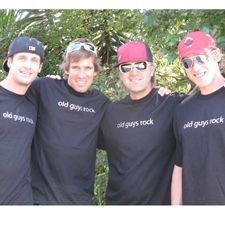By Jason Norman
LAGUNA HILLS, CA (BRAIN)—John Tomac made it seem all too easy, transitioning from professional racer to professional entrepreneur.
It’s been almost 10 years since Tomac, 40, launched a bike company with his name on the downtube. At the time, Tomac knew he’d only be racing for a few more seasons.
“I either wanted to work with a company building Tomac inspired replica bikes or do my own brand,” Tomac recalled.
After Tomac couldn’t come to terms with Giant for a contract extension in late 1997, Tomac saw the writing on the wall.
“It was time to go for it,” Tomac said. “I knew it would be tough. I knew it would be a financial risk, but I felt like I needed to do it.”
It was a calculated risk on Tomac’s part that has paid off in spades. “I felt like I had built the Tomac name in mountain biking to a point where it would have good value—a stand alone brand value,” Tomac said. Now, under the leadership of industry vet Joel Smith, the Tomac brand is turning heads once again.
But not every aging professional racer wants to have his or her own brand. And many, like Hans Rey, don’t wait until the end of their career to think about business opportunities.
“Early on in my career I found many alternative ways besides competition results to be of value to my sponsors,” Rey said. “To this day I generate as much media exposure worldwide as any other mountain biker.” Rey does indeed walk the walk with TV work, publicity stunts, riding clinics, photo shoots, his Adventure Team trips, marketing consulting and probably his most important venture, “Wheels 4 Life”—providing bikes to people in third world countries in need of transportation.
Rey, 41, said he’s not very interested in starting his own brand, and would only consider it if things really fell into place. “As we all know, it takes many other factors than a name to have a successful brand,” Rey said. “Mountain biking is a sport that doesn’t have as big, popular and mainstream names as Tony Hawk or Mat Hoffman.”
One of the biggest names the sport has known is Brian Lopes. It’s hard for a guy like Lopes to think beyond racing. Why should he? All he does is keep winning races.
“I don’t feel like I’m slowing down,” Lopes said. “I actually feel as though I’m in really good physical shape still.”
Still, he feels confident that a successful racing career can translate into the business arena.
“I think that success in racing can translate over,” Lopes said. “But there are also a lot of racers out there who don’t think that is possible. Business isn’t for everyone, but for me it’s interesting to learn that side of our sport and industry. I think it can be very beneficial for athletes to understand both sides—because without the companies making money there are no sponsorships. Helping the business succeed can only help the riders.”
As far as Lopes’ future plans outside of racing are concerned, nothing is set in stone. “I don’t have any definite plans, but I’m trying to set some relationships up for the future as I know I can not race at this level forever,” he said.
Lopes already has signature products on the market with Kenda USA, Troy Lee Designs, GT and Sportsmobile. He also wrote a book called “Mastering Mountain Bike Skills.”
“A Lopes line could be of interest, but who knows,” Lopes added. Lopes' GT contract expires at year's end. He has been racing for GT for the last seven years.
But the business side of things for these riders might be a moot point—if mountain biking doesn’t continue to grow, and flourish.
“I feel like mountain biking is still strong,” Tomac said. “There are bikes all over the place. People riding and having fun and staying fit, and ripping downhill runs—and ripping park runs. The initial trendiness as a new sport has faded, but we have a good core now—real riders who are committed. We now have second generations of mountain bikers, which is cool to see.”
No matter which way the industry turns, these three racers will most likely stay committed to cycling in one way or another.
“There are times when I think it would be fun to just get into something totally different since I’ve been involved with bikes since my racing career started in 1975,” Lopes said. “But it’s also hard to imagine not having to do with a sport that has given me so much. So to truthfully answer your question. No, I can’t ever see myself being completely out of cycling.”


